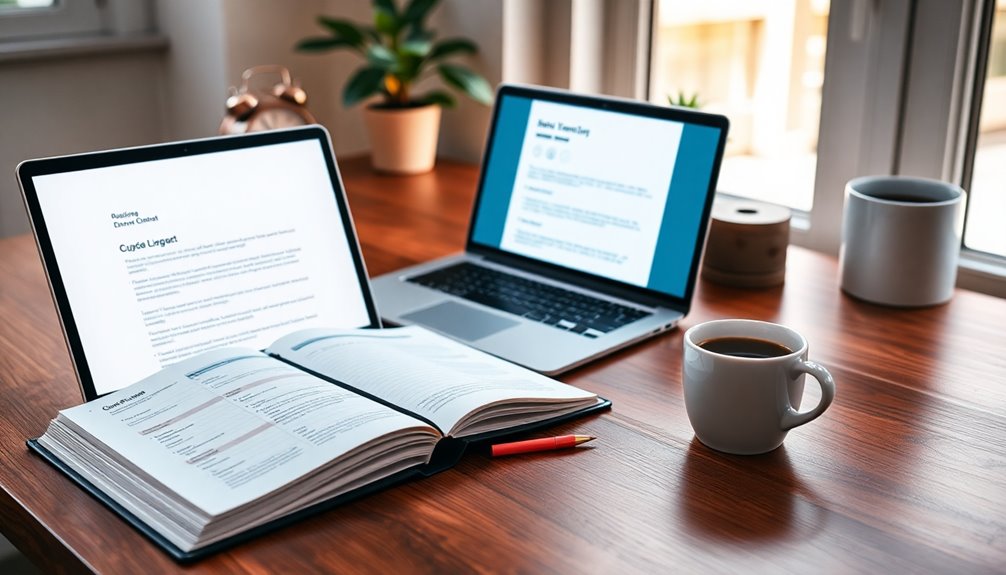Asking the right questions can make hiring managers enthusiastic to connect with you. Inquire about the history of the position to understand its evolution and challenges. Ask how success is measured to showcase your commitment to growth. Questions about team collaboration and company culture reveal your alignment with their values. Don't forget to explore opportunities for advancement, as this shows you're thinking long-term. Express curiosity about the challenges you might face, highlighting your readiness. With the right approach, you'll stand out. Discover more questions that can elevate your interview game and leave a lasting impression.
Key Takeaways
- Inquire about the specific challenges the company is currently facing to demonstrate your proactive problem-solving mindset.
- Ask how success is measured in the role to align your skills with their expectations and goals effectively.
- Request information on the company culture to assess your fit and showcase your interest in their values and work environment.
- Explore opportunities for mentorship and growth within the organization to emphasize your commitment to personal and professional development.
- Seek clarity on team dynamics and collaboration methods to illustrate your adaptability and willingness to contribute positively to the team.
What Is the History of This Position?

When you're considering a new role, asking about the history of the position can provide valuable context. Understanding how this role came to be is essential. Was it created due to company growth? If so, it might signal opportunities for advancement and exciting new projects.
You should also inquire about the predecessor. Why did they leave? Their departure can reveal challenges faced in the role and set clear expectations for you as the new candidate. If the position has been vacant for a while, it could indicate urgency in hiring or difficulties in finding the right fit.
Additionally, ask about the accomplishments of the predecessor. This insight can help you gauge the key responsibilities and goals for your potential role. It's also worth knowing if internal candidates were considered. This could reflect the company's promotion culture and how they value employee development.
In short, exploring the history of the position helps you understand what's expected and what you might achieve, setting you up for success right from the start.
What Are the Key Responsibilities?

When you ask about the key responsibilities of the role, you'll get a clear overview of the daily tasks you'll handle. Understanding these responsibilities can also help you pinpoint immediate challenges that might arise within the first few months. This insight will prepare you for what's expected and how you can make a meaningful impact.
Daily Tasks Overview
A clear understanding of daily tasks is essential for success in any role. In your position, you'll primarily focus on managing team projects, ensuring coordination with cross-functional departments, and meeting deadlines for deliverables that align with company objectives. You'll also track performance metrics and prepare reports for management, which requires you to implement strategies for continuous process improvements.
Regular communication with your team and stakeholders is important. You'll need to collaborate effectively and solve problems as they arise, enhancing the overall project management process. Maintaining an organized schedule and prioritizing your daily tasks is critical to support project goals and meet deadlines. You may often rely on project management tools to help you stay on track.
Additionally, you'll have responsibilities that include mentoring junior team members and facilitating training sessions. Engaging with your colleagues and contributing to a positive team culture will be key to fostering an environment where everyone can thrive. By focusing on these daily tasks, you'll not only fulfill your role effectively but also position yourself as a significant asset to the team.
Immediate Challenges Identified
Steering the immediate challenges in your new role requires a keen understanding of key responsibilities. You'll likely need to adapt quickly to existing team dynamics, tackle any backlog of work, and prioritize upcoming project deadlines. These immediate challenges demand your focus and problem-solving skills right from the start.
Key responsibilities typically include managing specific tasks or projects, collaborating with cross-functional teams, and ensuring alignment with organizational goals. By identifying these responsibilities, you can tailor your experience to demonstrate your readiness to tackle them effectively. During interviews, hiring managers are on the lookout for candidates who can swiftly pinpoint these challenges and outline actionable solutions.
Don't forget to clarify the success metrics related to these responsibilities. Understanding how your performance will be evaluated in the first few months is vital in setting yourself up for success. This clarity not only helps you align your efforts with the organization's expectations but also equips you to showcase your problem-solving abilities. Additionally, consider how your ability to manage home security system costs can reflect your financial acumen and resourcefulness. By addressing immediate challenges head-on and aligning your skills with key responsibilities, you'll position yourself as a valuable asset in the eyes of the hiring manager.
How Do You Measure Success?

When you think about how success is measured in a company, consider the specific metrics that align with its goals. You'll want to know how often evaluations happen and what criteria are in place for advancement. Understanding these elements can help clarify expectations and guide your personal growth within the organization. Additionally, utilizing data-driven marketing strategies can provide insights into performance and areas for improvement.
Success Metrics Defined
Success metrics are essential for defining how you and your team will gauge achievement and progress. By establishing clear criteria, you can align your efforts with company goals while also enhancing your career advancement opportunities. Common success metrics may include sales targets, customer satisfaction scores, and project completion rates.
To make sense of these metrics, here's a simple breakdown:
| Category | Example Metrics |
|---|---|
| Sales Performance | Revenue growth percentage |
| Customer Satisfaction | Customer satisfaction scores |
| Project Management | Project completion rates |
| Employee Recognition | Employee of the month awards |
Using Key Performance Indicators (KPIs) helps you evaluate performance effectively. Regular performance reviews, such as quarterly assessments or bi-weekly check-ins, allow you to track progress and identify areas for improvement. These reviews often tie back to measurable success metrics, reinforcing your achievements. Additionally, understanding your credit score can play a crucial role in achieving financial success in your career.
Evaluation Frequency Insights
Understanding how often evaluations occur is vital for aligning your performance with the company's expectations. Evaluation frequency can vary dramatically, ranging from quarterly reviews to annual assessments. Knowing this schedule allows you to tailor your efforts to meet those performance expectations effectively.
Regular feedback processes, like bi-weekly check-ins or monthly performance reviews, can be invaluable. They not only help you pinpoint areas for improvement but also keep you aligned with success metrics. It's important to understand that companies often employ a mix of self-assessments, peer reviews, and manager evaluations to create an all-encompassing view of your performance. This diversity in feedback sources guarantees you receive well-rounded insights.
Advancement Criteria Clarified
Measuring success in your role hinges on clearly defined advancement criteria that align with both your individual contributions and the organization's goals. To thrive, you need to understand the performance metrics that will be used to evaluate your work. Common metrics include sales targets, project completion rates, and customer satisfaction scores.
Regular feedback sessions, typically quarterly or biannually, are critical for evaluating your performance and ensuring you meet expectations. Additionally, many companies implement 360-degree feedback mechanisms, providing a holistic view of your strengths and areas for improvement.
Recognizing outstanding performance is essential, and employee recognition programs—like bonuses and awards—reward achievements that surpass set standards. These efforts not only celebrate individual success but also promote a culture aligned with organizational objectives. Furthermore, understanding the importance of performance metrics can guide your career growth effectively.
Here's a quick reference table for better understanding:
| Advancement Criteria | Performance Metrics | Employee Recognition |
|---|---|---|
| Individual contributions | Sales targets | Bonuses |
| Project outcomes | Project completion rates | Awards |
| Leadership qualities | Customer satisfaction scores | Public acknowledgments |
| Team collaboration | Peer feedback | Special events |
Understanding these elements can guide your career growth effectively.
What Challenges Should I Expect?

When you plunge into a new role, it's crucial to uncover the challenges you might face. By asking targeted questions, you can gain valuable insight into what to expect. Start by inquiring about the specific challenges the company currently faces. This knowledge allows you to position your skills as potential solutions, showcasing your proactive approach to problem-solving.
Next, ask about project deadlines and resource constraints. Understanding these elements reveals the pressure points within the team and how you might be expected to contribute. Additionally, inquire about the biggest challenges previous hires encountered. This can provide you with insight into potential pitfalls and areas where you can excel or need to prepare.
Don't forget to learn about industry trends affecting the company. This will help you grasp the broader challenges and how your role fits into the strategic response. Finally, understanding the company's approach to conflict resolution can highlight potential interpersonal challenges you may face, as well as the support systems in place to navigate them. By gathering this information, you'll be better equipped to tackle the challenges ahead and excel in your new position. Moreover, having a solid grasp on the importance of open communication can significantly enhance your ability to resolve conflicts effectively.
What Opportunities for Growth Exist?

When considering a new role, it's critical to ask about mentorship and training programs that can support your professional development. Understanding the career advancement pathways available can help you gauge how the company invests in its employees' growth. These opportunities not only enhance your skills but also contribute to long-term job satisfaction and retention.
Mentorship and Training Programs
Mentorship and training programs are essential components of a thriving workplace, offering employees significant opportunities for growth and skill enhancement. When you engage in these initiatives, you not only improve your current skill set but also position yourself for future success.
Here are some benefits of participating in mentorship and training programs:
- Guidance from Experienced Mentors: You'll have the chance to learn from seasoned professionals who can provide valuable insights into your career path.
- Tailored Skill Development: Many organizations offer targeted training programs that address the specific skills needed for your role, keeping you updated on industry trends.
- Continuing Education Support: Companies often provide tuition reimbursement and access to professional certifications, encouraging you to pursue further qualifications. Additionally, participating in training can enhance your understanding of Software Development Life Cycle (SDLC) and its impact on software quality.
Career Advancement Pathways
Career advancement pathways play an essential role in shaping your professional journey, as they provide a clear roadmap for growth within an organization. Many companies offer structured pathways that include defined promotion timelines, typically ranging from 1 to 3 years, based on your performance metrics and readiness for the next role.
Engaging in mentorship programs can greatly enhance your career progression. These programs help you build relationships with experienced professionals who can guide you in acquiring the competencies needed for higher-level positions. Additionally, organizations often support employee development through skills training initiatives and lateral moves across departments. This allows you to gain diverse experiences, broadening your skill set and facilitating upward mobility.
Companies that prioritize employee development frequently invest in continued education programs, covering costs for certifications and courses that align with your career goals. The presence of such growth opportunities not only boosts your potential for advancement but also contributes to higher employee retention rates. With clear advancement pathways, organizations report a notable increase in employee satisfaction and loyalty, making it essential for you to inquire about these opportunities during your job search. Furthermore, reflecting on past mistakes can foster resilience and enhance your readiness for new challenges in your career.
How Is Feedback Provided?

How do organizations guarantee that employees receive constructive feedback? They implement structured performance reviews, typically conducted quarterly or annually, to guarantee regular evaluations of your progress. These reviews help you understand your strengths and areas for improvement, enhancing your overall performance.
To create a more thorough view of your performance, many companies utilize 360-degree feedback systems. This means you'll get input not just from your supervisor but also from peers and direct reports.
Additionally, real-time feedback is becoming the norm. Regular one-on-one check-ins between you and your manager facilitate continuous improvement and allow for prompt resolutions to any issues. This approach fosters a culture of open communication that can drive employee engagement.
Here are some key elements organizations often incorporate:
- Feedback tools or software for anonymous input, promoting constructive criticism.
- Engagement surveys to assess how well your contributions are recognized.
- Actionable insights tailored to help you grow in your role.
What's the Company Culture Like?

Understanding a company's culture is essential for determining whether you'll thrive in that environment. The company culture encompasses shared values, beliefs, and behaviors that shape how you and your colleagues interact and work together. A positive culture can greatly boost employee satisfaction, leading to higher morale and retention rates.
When exploring a potential employer, consider asking about the work environment. Does the company emphasize open communication and employee recognition? Are there initiatives promoting diversity and inclusion? Research shows that organizations with strong cultures experience 30% higher employee satisfaction and are 50% more likely to achieve high performance.
Additionally, inquire about policies that support a healthy work-life balance, like flexible work arrangements or wellness programs. These elements contribute to a supportive atmosphere, making it easier for you to succeed.
To gain insight into the company culture, ask about team dynamics, leadership styles, and how values guide decision-making. Understanding how employee feedback is integrated into the organizational framework can also reveal a lot about the work environment. Ultimately, knowing the company culture helps you assess if it aligns with your own values and work style.
How Does the Team Collaborate?

Company culture isn't just about values and beliefs; it also shapes how teams work together. Understanding how a team collaborates reveals the tools and practices that drive their success. You'll want to ask about the platforms they use for communication, like Slack or Microsoft Teams, and project management tools such as Asana or Trello.
Consider these key points when inquiring about collaboration:
- Frequency of Team Meetings: Ask about daily stand-ups, weekly check-ins, or monthly reviews to grasp their collaborative rhythm.
- Agile Methodologies: Explore whether they utilize Scrum or Kanban to facilitate iterative progress and effective collaboration on projects.
- Cross-Functional Opportunities: Discover how departments work together and share knowledge to achieve common goals.
Additionally, find out if there are team-building activities or workshops that enhance collaboration and strengthen interpersonal relationships among team members. By asking these questions, you'll gain valuable insights into the team dynamics and how well they collaborate, ultimately helping you determine if it's the right fit for you.
What Do You Enjoy About Your Role?

One of the best ways to connect with a hiring manager is to ask what they enjoy about their role. This question not only opens up a dialogue but also provides insight into their personal motivations. When they share what excites them, you'll get a clearer picture of how their values align with the company's mission.
By focusing on their passions, you encourage them to discuss positive aspects of the workplace culture, making the conversation more engaging. Their answers can reveal key areas of focus within the role and the team dynamics that drive success. This is your chance to understand the environment you might be stepping into.
Additionally, when hiring managers talk about what they enjoy, they might inadvertently highlight opportunities for collaboration and innovation. This can inform you about how you can contribute to the team's success if hired. Listening closely can also uncover potential areas for professional growth, allowing you to envision your future in the company. So, don't hesitate—ask this question and see how it can deepen your connection with the hiring manager.
What Are the Next Steps in the Process?

After an interview, it is crucial to know what comes next in the hiring process. Asking about the next steps not only helps you manage your expectations but also gives you a clear timeline for follow-up actions. Here are a few things you should consider asking:
- What's the decision-making timeline? This helps you gauge how quickly you can expect feedback and potentially an offer.
- Will there be additional interviews or meetings? Understanding if you'll meet with other team members provides insight into the depth of the hiring process and the company's commitment to finding the right fit.
- Is there any required paperwork or background checks? Knowing about these administrative tasks can prepare you for what comes after a successful interview.
Additionally, clarifying who holds the decision-making authority allows you to understand who will ultimately determine your hiring fate. This knowledge enables you to build rapport with key decision-makers during the interview process. By asking these questions, you not only show your interest but also position yourself as a proactive candidate, ready to engage with the next steps in the hiring process.
Frequently Asked Questions
What Is an Intelligent Question to Ask an Interviewer?
An intelligent question to ask an interviewer could be about the team's current challenges. For instance, you might say, "What's the biggest challenge your team is facing right now?" This shows you're engaged and keen to understand the dynamics of the team. It also gives you insight into potential hurdles you'll need to navigate and demonstrates your willingness to contribute solutions, making you a more appealing candidate for the role.
How to Impress a Hiring Manager?
To impress a hiring manager, you've gotta show sincere curiosity and confidence. Start by digging into their recent triumphs and trials, then craft clever questions that connect your skills to their needs. Don't shy away from discussing team dynamics, success metrics, and growth opportunities—these show you're committed. Finally, express interest in their future projects; this illustrates your forward-thinking mindset and enthusiasm to contribute to their vision.
Do Hiring Managers Like When You Ask Questions?
Yes, hiring managers appreciate it when you ask questions. It shows you're genuinely interested in the role and the company. By engaging them in conversation, you can highlight your critical thinking skills and proactive attitude. Thoughtful questions can also help you understand the company's goals and culture better, ensuring you're aligned with them. Ultimately, asking questions can leave a positive impression and enhance your chances of making a strong connection during the interview.
What Is the Best Question to Ask an HR Manager?
When you're speaking with an HR manager, one of the best questions you can ask is about the company's approach to employee development. This shows you're interested in growth opportunities and how the organization invests in its people. You might also consider asking about the metrics used to evaluate performance, which can highlight your focus on accountability and success in your potential role. These questions can help you gauge if the company's values align with yours.
Conclusion
As you wrap up your interview, remember that asking the right questions not only impresses hiring managers, but it also shows your genuine interest in the role. Coincidentally, their answers might reveal surprising insights that align perfectly with your career goals. You're not just a candidate; you're a potential team member enthusiastic to contribute. By engaging in this dialogue, you create a connection that could very well lead to the offer you've been hoping for.
Felicity, our Author, pens in-depth articles and guides that delve into the heart of personal discovery. Her narrative-driven approach weaves together theory, practice, and personal anecdotes, making the journey of self-exploration both relatable and inspiring. Felicity’s contributions help illuminate the path for those seeking a deeper understanding of themselves and their relationships.










